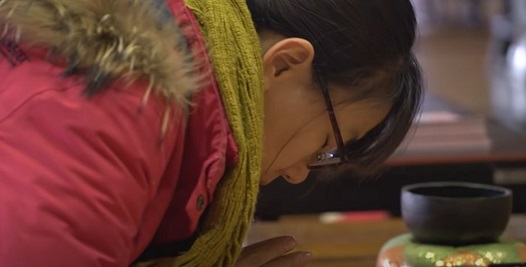Buddhists throughout East Asia chant the version of the Heart Sutra that goes back to the legendary translator Xuanzang, who lived about 14 hundred years ago. That is to say, Buddhists in China, Vietnam, Japan, and Korea all use Xuanzang’s text, but they pronounce the 270 characters in that text differently. Below you can find […]
Category: chanting
“Kido” means “pray” (祈禱 기도)
羅季天成中, 正甫崔殷諴, 久無胤息, 詣玆寺大慈前祈禱.
translation: “During the ending [years] of the Silla in the Tiancheng era, Jeongbo Choe Eunham for a long time [had] no sons. So he went before the shrine of Kwan Seum Bosal (大慈) and prayed (祈禱).”
The Korean Heart Sutra
1—————————————————————————————–
摩 訶 般 若 波 羅 蜜 多 心 經
마 하 반 야 바 라 밀 다 심 경
ma ha ban ya ba ra mil ta shim gyong
2—————————————————————————————–
觀 自 在 菩 薩 行 深 般 若
관 자 재 보 살 행 심 반 야
kwan ja jae bo sal haeng shim ban ya
Jijang Bosal Chanting: The Text
8. Closing (Praising the Buddha’s Infinite Virtue and Merit)
刹塵 十念 可數知 大海 中水 可 飮盡
찰진 십염 가수지 대해 중수 가 음진
chaljin shibyeom gasuji daehae jungsu ga eumjin
虛空 可量 風可繫 無能 盡說 佛 功德
허공 가량 풍가계 무능 진설 불 공덕
heogong garyang punggagye muneung jinseol bul gongdeog
Kwan Seum Bosal Chanting: The Text
7. Mantra of Universal Dedication
普 回向 眞言
보 회향 진언
bo hohyang jinon
3x:
唵 娑摩囉 娑摩囉 弭摩曩 婆囉摩訶 左乞囉 嚩攞 吽
옴 삼마라 삼마라 미만나 사라마하 자거라 바라 훔
om samara samara mimana saramaha jageora bara hum
Kwan Seum Bosal Chanting Part Six: Repairing Mistakes (補闕眞言)
The mantra: 唵 好魯好魯 舍野謨契 娑婆訶
ǎn hǎo-lǔ-hǎo-lǔ shè-yě-mó-qì suō-pó-hē
唵 好魯好魯 舍野謨契 娑婆訶
옴 호로호로 사야모케 사바하
om hororo sayamoke sabaha
Xuanzang’s Homage to Maitreya
願共諸眾生,
願 = wish
共諸 = universal
眾生 = sentient beings
上生兜率天,
上生 = above born
兜率天 = Tuṣita Heaven
奉見彌勒佛。
奉 = serve
見 = see
彌勒佛 = Maitreya Buddha
Homage to the Three Jewels: notes and comments
This post is about the chant. To see (and hear) the chant itself, please refer back to the previous post, which has the whole chant in Hanja, Hangul and romanized transliteration, some very literal translations, and a video: Ye Bul (禮 佛 / 예 불), AKA: Homage to the Three Jewels First, lets look at […]
Ye Bul (禮 佛 / 예 불), AKA: Homage to the Three Jewels
天下宗師 一切微塵數 諸大 善知識
천하종사 일체미진수 제대 선지식
chon ha jong sa il che mi jin su je dae seon ji shik
heaven below grand master all small particles count every great good perceive realize (善知識 = kalyāṇa-mitratā: admirable friendship, sacred friendship)
We sincerely pay homage to all the previous generations of great masters who have brought the lamp of the dharma from the west to the east, and to Korea in particular, and to all of our great teachers and spiritual friends, who are as numerous as the atoms of the universe.
Master Uisang’s Haein-do (aka “The Song of Dharma Nature”)
14
Bodhisattvas use this Dhāraṇī like a bottomless treasure chest
To decorate and glorify Dharmadhātu, the palace of the Mind.
15
Sit down in your Original Place and see
That everything is as it is, like Buddha of old.




